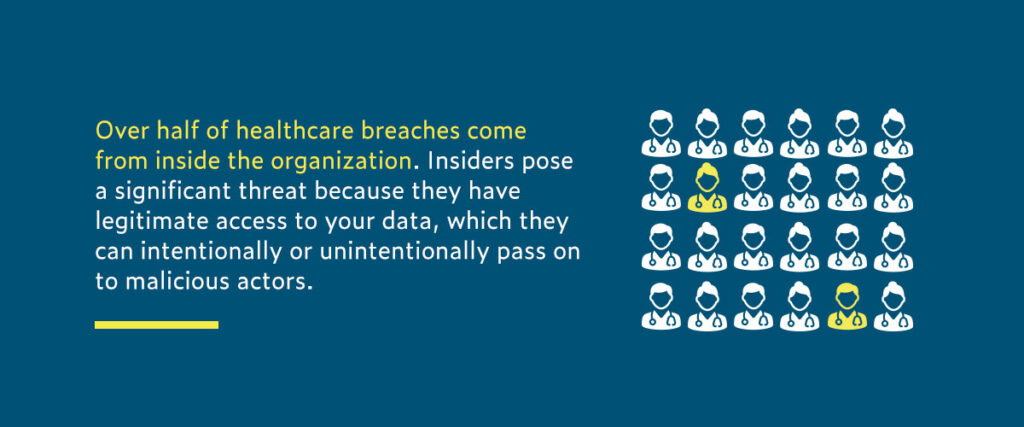
Technology has transformed healthcare, giving professionals access to updated patient records to raise the standard of care. Electronic health records (EHRs) are a big part of this transformation, with 75% of healthcare providers believing they help provide better patient care. Many healthcare organizations rely on these records in their daily activities.
While EHRs and other digitized healthcare operations have significant benefits, they also open patient data to potential cyber threats. Over 100 million healthcare records have been breached as of November 2023, causing considerable damage to organizations, staff and patients. The first step to combat cybercrime is understanding the biggest cybersecurity threats so you can take the necessary steps to protect yourself.
Why Are Cybersecurity Threats in Healthcare So Prevalent?
The healthcare industry is especially vulnerable to cyberattacks. Malicious actors have many reasons to target healthcare institutions, from the masses of patient data to the potential reward of holding their information hostage. Healthcare data is attractive to cybercriminals as they can use it to perform identity theft and fraud, such as obtaining false insurance claims, prescription drugs or even receiving treatment with someone else’s identity.
As healthcare data is valuable, many institutions take every possible cybersecurity measure. Yet, it’s still vulnerable to cybercrime for several reasons, including lack of endpoint device management, limited budgets and human factors like overworked staff and lack of security awareness. Healthcare systems also involve complex supply chains, and cybercriminals can identify and target weaknesses to access sensitive data.
5 Biggest Cyber Threats in Healthcare
The cyber threat landscape is evolving. New threats appear often, forcing healthcare organizations to take a proactive stance on maintaining HIPAA data security requirements. They consistently innovate, refining their methods to maximize their chances of success. The top 5 cybersecurity threats in healthcare include:
1. Phishing
Phishing is the most widespread cybersecurity threat in healthcare. This social engineering attack involves attackers using email or text messages — also known as smishing — to gain personal information. A staggering 93% of cyberattacks start with a phishing email.
Phishing attempts often appear to come from a legitimate medical organization and encourage the recipient to click on a link. Recipients are directed to a decoy web page and asked to submit their credentials. Once they have, cybercriminals can use them to access healthcare systems.
2. Ransomware Attacks
Ransomware attacks have hit 60% of healthcare companies in the past year. In this attack, cybercriminals inject malware into your system, often delivered by a phishing attack. The malware encrypts or infects your sensitive data, rendering it unusable until you pay a ransom.
Hackers understand that healthcare organizations must remain operational. They leverage the understandable panic when you can’t access patient data to increase the chance of payment to resume treating patients.
3. Data Breaches
A data breach is a cybersecurity incident in which unauthorized parties access sensitive data like bank account numbers or healthcare information. Although many assume a data breach is another term for a cyberattack, many cyberattacks don’t breach data confidentiality to achieve the hackers’ goals.
The healthcare industry experiences more data breaches than any other sector. Personal health information (PHI) is precious on the black market, even more than credit card credentials. Many incidents can result in a breach, from lost devices to insider threats and malware. Failing to keep patient data secure can result in considerable financial and reputational loss for your organization, and preventing a breach is a primary goal for many.
4. Distributed Denial of Service (DDoS) Attacks
A DDoS attack involves flooding your server with face connection requests and forcing your organization offline. While these attacks don’t put your data at risk like ransomware, they have the same effect on your ability to operate. Some cybercriminals prefer this method because they can create the same disruption without compromising a network, so they can deploy them on a broader scale.
As these attacks are fast and effective, some hackers pair them with ransom requests, forcing healthcare organizations offline until they pay the ransom. They represent a significant risk to healthcare organizations that need access to patient information.
5. Insider Threats

Over half of healthcare breaches come from inside the organization. Insiders pose a significant threat because they have legitimate access to your data, which they can intentionally or unintentionally pass on to malicious actors. This type of threat is challenging to detect, and many unintentional breaches are preventable with the proper training and cybersecurity measures.
How to Combat Cyber Threats in the Healthcare Industry
Lack of cybersecurity poses a significant threat. A single successful phishing attempt can cause considerable damage to every aspect of your organization. Protecting yourself from cyber threats requires a proactive approach, following cybersecurity best practices and consulting industry-specific experts. Some steps you can take to protect your patients and operations include:
1. Conduct a Thorough Risk Assessment
You can only protect yourself when you understand your vulnerabilities. Outsourcing cybersecurity assessments are the best way to leverage your strengths and address your weaknesses. An industry-specific managed services provider (MSP) reviews and prioritizes your level of risk based on several factors and provides guidance on how to handle your current cybersecurity posture.
As healthcare is a high-risk industry, conduct a minimum of one assessment a year to stay ahead of the latest cyber threats.
2. Leverage the Latest Cybersecurity Controls
Legacy systems pose another level of cybersecurity risk as they lack the scope to combat modern threats. Beyond basic security controls, invest in advanced systems purpose-built to protect your data and systems. Your MSP can help you select suitable security systems based on your needs and budget.
3. Educate Your Team
One of the most potent ways to fight cybercrime is to create a security culture within your organization. Provide your team with comprehensive cybersecurity training and raise awareness about common threats they may encounter. Protecting your organization is a team effort. Empower your personnel with the knowledge to proactively protect themselves, patients and the organization.
4. Establish Robust Cybersecurity Policies and Procedures
A strong security policy can help your organization manage cybersecurity by setting baseline expectations for everyone. Some standard policies for healthcare organizations include controlling who can access information within your system and devising an incident response plan so that everyone on your team knows what to do if a breach occurs.
5. Consult the Experts
Cybersecurity is a vast and complex field. Consulting an MSP with industry-specific cybersecurity expertise is the best way to safeguard your networks and data. They can take care of the cybersecurity logistics so that you can focus on what you do best — providing the highest quality patient care.

Protect Your Patients With Prelude Services
Increasing your cybersecurity is non-negotiable in today’s threat landscape, and when you’re investing, you need a team you can trust on board. As an MSP specializing in healthcare, Prelude Services is uniquely positioned to help you protect sensitive patient data. Our advanced IT security systems are ideal for protecting your patients and organization.
Our experienced technicians will configure and monitor your entire IT network, keeping your critical information safe from cyber threats with various innovative strategies, including hardware and software support, information security and vulnerability identification. Contact us to protect your organization from cyberattacks today.
CONTACT PRELUDE SERVICES FOR 24/7 IT SUPPORT
Technology has become a crucial part of the modern business experience. Without functional computers and mobile phones, many business practices would grind to a halt. Unfortunately, breakdowns and malfunctions are an inevitable part of any machine, meaning businesses do grind to a halt until the issues are fixed. In order to keep your business running, it's crucial to have access to IT support when you experience technical difficulties.
If you're a healthcare company, long-term care provider, or small business in need of IT support at all hours, consider Prelude Services. We're a SSAE SOC
Compliant business dedicated to improving your security and functionality. We offer specific IT services for senior living care, nursing homes, retirement home services and assisted living, including 24/7 IT support. If you want to know how Prelude can help you, contact us today!
